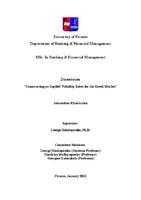Constructing an implied volatility index for the greek market

Master Thesis
Author
Πυλαδαρινός, Αλέξανδρος
Date
2011-10-12View/
Subject
Αγορά χρήματος ; Οικονομικές κρίσεις ; Ελλάδα -- Οικονομικές συνθήκες -- 21ος αιώνας ; Stock index futures -- Econometric models ; Stock optionsAbstract
This dissertation studies the construction of a Greek implied volatility index, named VASEX using the CBOE’s model-free methodology, reinforced with a tool provided by Jiang and Tian [(2005) and (2007)]. We use the cubic spline interpolation method to deal with the limited availability of strike prices due to the limited trading on the ADEX’s options and thus we end up with a smoothed data set closer to the prerequisites of the model. We study the properties of VASEX and then examine the relationship of VASEX with the underlying stock index FTSE/ASE-20, and hence with the Greek equity market. We also concentrate on the impact of the Global financial crisis upon this relation and continue our analysis, testing whether VASEX can be characterized as a leading-market indicator. Moreover, we study the volatility spillovers across international markets via econometrics analysis (correlation analysis, VAR analysis and Granger causality tests) for the implemented indices VASEX, VIX, VDAX, VCAC, VSMI and VSTOXX. Finally, we access the information content of the VASEX index and its forecasting ability about the future realized volatility. Toward this end, we construct the GVIX implied volatility index proposed by Skiadopoulos (2004) in order to compare their forecasting ability. Since GVIX is a Black-Scholes implied volatility index we also study whether its information content is subsumed by the model-free VASEX index. This is an argument of great interest, as recently a lot of research is done in this field [see for example Areal (2008)]. However, to the best of our knowledge no previous research exists for the case of the Greek market and is limited for the cases of illiquid and low depth markets.


